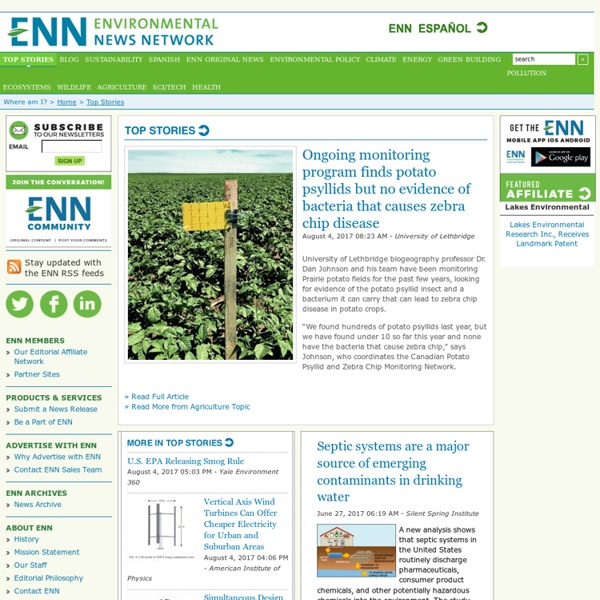



Terretv - La télé web des générations futures Environmental Research Green Options - Organic living, eco product reviews, tips for going green and more how to save the world News From PESWiki PESWiki Blog A lot of action here presently. Most of the new stuff is going here. Featured: PES Network > News > Free Energy Blog - Latest include: They did not read the safety manual • HopeGirl on QEG, in London • German Group achieves QEG resonance • Zenith of manufacturing: Airbus A380 • Latest on QEG: Re-insulating Core • YMNEE Provides 1 MW QMoGen Photos • MORE... Free Energy News Saturday, April 12, 2014 Featured: Solar > Conspiracy > Irony: Chinese Solar deal could start next American revolution at Bundy ranch - A heated situation in Nevada -- standoff between 140-year homesteading family rancher Cliven Bundy -- and BLM, apparently has its origin with a sweetheart $5 billion deal between Senator Harry Reed and the Chinese to put solar panels and manufacturing on the land. Friday, April 11, 2014 Thursday, April 10, 2014 Wednesday, April 9, 2014 Tuesday, April 8, 2014 Monday, April 7, 2014 My Dad & the World’s Most Accurate Atomic Clock - On pedigree. Sunday, April 6, 2014 Note
The EnviroLink Network Ecosystem services Humankind benefits in a multitude of ways from ecosystems. Collectively, these benefits are known as ecosystem services. Ecosystem services are regularly involved in the provisioning of clean drinking water and the decomposition of wastes. While scientists and environmentalists have discussed ecosystem services implicitly for decades, the ecosystem services concept itself was popularized by the Millennium Ecosystem Assessment (MA) in the early 2000s.[1] This grouped ecosystem services into four broad categories: provisioning, such as the production of food and water; regulating, such as the control of climate and disease; supporting, such as nutrient cycles and crop pollination; and cultural, such as spiritual and recreational benefits. To help inform decision-makers, many ecosystem services are being assigned economic values. §History[edit] In 1956, Paul Sears [7] drew attention to the critical role of the ecosystem in processing wastes and recycling nutrients. §Definition[edit]
The Carbon Capture Report Pär Holmgren: Sluta klaga – köp ditt eget kraftverk | Miljö | Debattämnen | Debatt Det är många i Sverige som i dag betalar onödigt mycket för sin el. När elpriserna går upp klagas det över höga elpriser, men i stället för att klaga kan många mycket enkelt se till att kostnaden för elen blir lägre. För drygt tio år sedan köpte jag och min fru andelar i vindkraft. Vi betalade då totalt 24 000 kronor för fem andelar som sedan dess har gett oss 5000 kWh per år till självkostnadspris. För närvarande betalar vi 59,4 öre per kWh, och det inklusive både energiskatt och moms. De senaste tio åren har vi betalt cirka 30 000 kronor för vår hushållsel. Anledningen till att de andelsägda kraftverken kan ge så billig el är att de som bygger verken inte behöver låna ihop pengar till bygget. Men hur kan jag då vara säker på att det är just mina ”gröna” elektroner som kommer ut genom kontakterna hemma i huset? På ett liknande sätt kan jag som elkonsument ta ett ansvar för att den el som finns på mitt ”elkonto” är producerad på ett bra sätt.
Nuclear News | What The Physics?